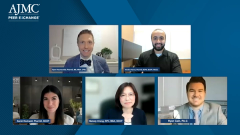
Protocol For Urgent and Around-the-Clock Bispecific Care
The panelists discuss 24/7 bispecific care protocols for urgent healthcare needs.
This is a video synopsis/summary of a Peer Exchange involving Ryan Haumschild, PharmD, MS, MBA, CPEL; Kirollos Hanna, PharmD, BCPS, BCOP, FACCC; Sarah Rockwell, PharmD, BCOP; Melody Chang, RPh, MBA, BCOP; and Ryan Cain, PA-C.
The video discusses best practices for managing patients on bispecific antibody therapy. Haumschild highlights the importance of after-hours care for handling adverse events or urgent patient issues. Hanna outlines the protocol his clinic has established to educate on-call physicians on assessing and triaging bispecific therapy complications, as well as transferring patients to partner hospitals with experience managing cytokine release syndrome and immune effector cell–associated neurotoxicity syndrome. He emphasizes the value of preemptive communication and collaboration between community practices and academic medical centers. Chang suggests additional best practices for academic and community collaboration, including establishing clear communication channels, holding regular case discussions, developing standardized treatment protocols, sharing educational materials and guidelines, and organizing joint tumor board meetings. She notes that such coordination can expand patient access and clinical trial enrollment. The discussion centers on how strong partnerships between different care settings can optimize patient outcomes with emerging bispecific therapies.
Video synopsis is AI-generated and reviewed by AJMC® editorial staff.
Newsletter
Stay ahead of policy, cost, and value—subscribe to AJMC for expert insights at the intersection of clinical care and health economics.










